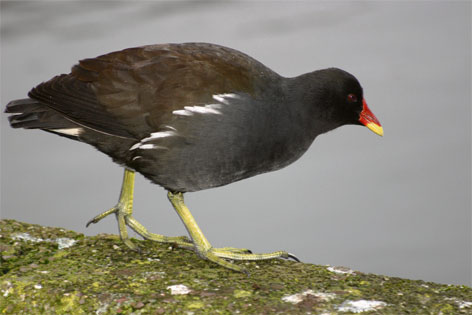Birds: Moorhen (Cearc uisce), Gallinula chloropus
By Niall Hatch. A common sight on ponds, canals, lakes and slow-flowing streams, the Moorhen is found throughout Ireland. It belongs to the rail and crake family, though unlike most members of that group, such as the scarce Corncrake, it is not a particularly shy or secretive bird. It often comes out into the open and permits close approach by humans.
 Moorhens can be seen at any time of the year, though almost always on, or in the immediate vicinity of, freshwater. At around 32cm in length, they are more or less half the size of the familiar Mallard duck. Adult birds are unmistakable when seen well, boasting a bright yellow-tipped red bill that extends up onto the forehead to form a hard “shield”. The head, breast and belly are a dark sooty grey, the wings and back are dark brown, and they have a jagged white stripe along each side of the body and a small white patch at either side of the tail. They also have bright yellowish-green legs with almost comically large feet. Young birds are far more muted and brownish overall, with duller bills.
Moorhens can be seen at any time of the year, though almost always on, or in the immediate vicinity of, freshwater. At around 32cm in length, they are more or less half the size of the familiar Mallard duck. Adult birds are unmistakable when seen well, boasting a bright yellow-tipped red bill that extends up onto the forehead to form a hard “shield”. The head, breast and belly are a dark sooty grey, the wings and back are dark brown, and they have a jagged white stripe along each side of the body and a small white patch at either side of the tail. They also have bright yellowish-green legs with almost comically large feet. Young birds are far more muted and brownish overall, with duller bills.
Picture by Terry Flanagan
One of the world's most widely-distributed bird species, Moorhens are found throughout much of Europe, Africa, Asia and the Americas. They enjoy a varied diet, including pondweed, seeds, worms, snails, small fish and even birds' eggs. They pump their heads back and forth when swimming, and often fly over short distances with their legs dangling limply below their bodies. It is thought that their large feet evolved both to distribute their bodyweight – helping them to walk better on top of floating vegetation – and to help them clamber about on branches: unusually for a waterbird, they like to sleep in trees and bushes.
If you would like more information on Ireland's birds, or would like to join BirdWatch Ireland and support their conservation work, please write to BirdWatch Ireland, PO Box 12, Greystones, Co Wicklow. Alternatively, call 01 2819878, email info@birdwatchireland.ie or visit www.birdwatchireland.ie
